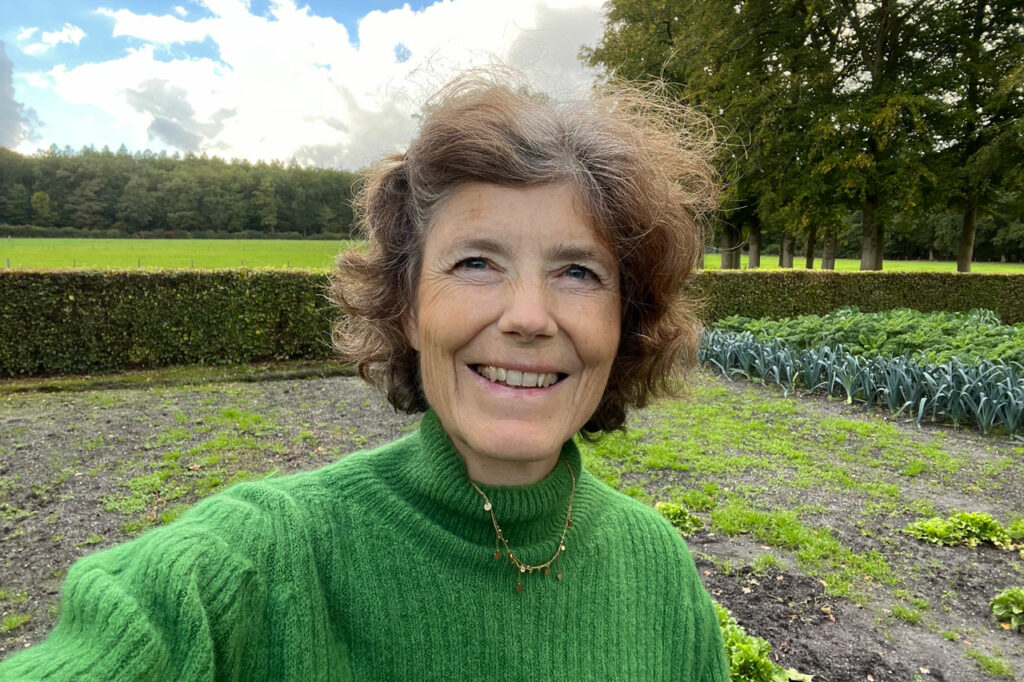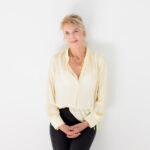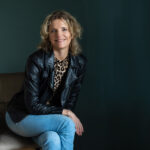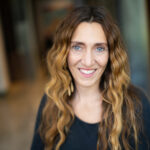“To mother is a presence. You give another space to be what they are designed to be in this life.”
Caroline Reineke (The Netherlands)
Can you share a bit about your upbringing and what you got reflected from your parents or people around you with regards to motherhood?
Nothing comes to me, as in what I got from my upbringing around motherhood. It was more something that was part of being a woman and that at some point, you might become a mother. It didn’t feel like something for me, while growing up. When I was older, and I had boyfriends, and friends around me started to have children, I was still like, ‘This is not my thing.” Very simple. So, to answer your question, it was around me, but I never really got a message directly from my family that I had to become a mother. It was more in the periphery of society that it is a thing you at least need to consider in your life. At some point in my life, I did ask myself the question, “Why don’t I have this feeling that I want to become a mother?”
So, you were not placing any attention on it at all?
Indeed. The question of becoming a mother didn’t have my attention at all. I had people around me, friends, who would love to marry and have children. Some already knew how many children they wanted. I was like, “Great for you, but for me it is not in my system.”
Was there something else in your system? That you wanted to do a certain thing or was there any other picture about life?
There was a picture that was more about how you should be in life and around work, but it had nothing to do with motherhood. It was more the picture that you go to high school, then university and then you get a job. I had no clue what kind of job. But the job was a thing, and so there was the importance of study. That was my concern, and not this whole family thing, and being a mother.
Can you remember a certain moment though, when you felt, now I have to think about motherhood?
Yes, there were some moments. For instance, when nearly everybody around me was having children. Although I felt, “That’s great for you, but not for me”, there was a moment when it felt that becoming a mother was knocking on my door. It was more an internal thing. Deep down I felt clearly, ‘not in this life,’ but somehow, I did go into self-doubt, asking, “Why am I not at least a little bit into this motherhood thing?” And there was one moment during a self-development course I did. I can strongly recall wanting to go to the essence of myself and getting to know myself. I remember thinking, “I don’t even know myself or how to keep a boyfriend. So how can I start a family?” That felt like a big thing. There was this nagging feeling though, “Why am I so clear about something, while for most women it is completely the opposite?” During this course I brought this in as a theme. “Why am I having such a resistance? What is wrong with me that I don’t have that desire?” That was my starting point.
So ingrained was the societal expectation that as a woman, we need to have children at some point in our life (expectation number one) and that we really want children (expectation number two).
And all the while I was making it personal. As if the other option: ‘there is another path for me as a woman was not a legitimate option’. I did all these in-depth exercises. What came up first for me, was that having a family felt complicated. Taking care of and raising children is not something to take lightheartedly. What I observe is that it is a time-consuming thing. You need to be there for them and be a solid couple first in order to raise children. Becoming parents is not the same as knowing how to parent. How do you know you do the right thing? And most of all I had the feeling I would lose myself in the ‘role’ as a parent.
There was also resistance to perhaps settle or to take up responsibilities in life. In my eyes having children was a huge — like really huge — responsibility. Like something you were stuck for life with, and you are the one needing to take care of them 24/7. I was not even able to take responsibility of my own life (laughs). But was it truly a resistance or was it just not my thing? When a woman says, “Motherhood is not my thing,” it can be interpreted as, “Oh, you’re just resisting it. Wait till you’re 32 and your ovaries start ticking, then you will want it.” In hindsight I hear the societal expectations talking to me through these remarks.
For me it was difficult to connect with what you are supposed to be doing in life. In that moment during the course, I made a deal with myself. And that was very soothing for me. I was like, okay, Caroline, you already have a hard time to keep a boyfriend. If you find a man, and he is a potential father and you are settled, then take some space to think about it. I never met that guy during my twenties and thirties. I had this soothing ideal that when I turned forty, I would have this good excuse to say, “Time has passed, it’s too late to have children.” After that, motherhood will no longer knock on my door.
Were you ever in a long-term relationship in your thirties with somebody who wanted a child?
Yes, I did have a boyfriend for a while, but he was living abroad, so we never settled together. He had this strong idea about getting married and wanting a boy and a girl.
I felt that during the entire relationship. It was pressing on me. I didn’t want this package that came with him, of becoming the wife and then being a mother. That is why the relationship ended, and eventually he found a wife and had two kids. He had his perfect picture. I strongly knew I am not here to fulfil perfect pictures for anyone.
Did you ever get comments, remarks or questions like, “Oh, but one day you will?”
Yes, I did get questions. But it was very simple, because I had an easy way out, “I don’t have a boyfriend at the moment.” Or I would say, “Well, that is something to consider when you have a partner.” Or “I will cross that bridge when I get there.” These were my little ways out. Or I would say “I don’t have a strong motherhood wish, but you know, who knows, one day I will.”
What I hear you saying, is that you needed to have an excuse.
Yes, I never felt I can just be me and be in life. There was always this motherhood thing in the background, saying you have to be with somebody and then have children. In the moments I was very clear, when people would say, “Wow, you’re quite clear on it.” It seems like you always have to give an excuse, justification or clarification. Again, a societal expectation talking to me. As if I can’t be different. I can’t say ‘no, not for me’. That in itself, is interesting. And as I said earlier, in a way I was also still dealing with myself and how to relate to life.
You are the oldest daughter of three. Your middle sister is a mother, your youngest sister is not. Was there a sense of relief when your middle sister had children?
Yes, in a way. I did feel like, “Okay, one sister has covered the whole picture; she married and got three kids. Now my parents have what they want: they are grandparents.” And that is another topic, the pressure from parents who want to be grandparents. I remember friends of my parents, who were quite demanding about having grandchildren. Even if they don’t say it – although some do – you can feel it when it’s there. That is another imposition: “I want my grandchildren.
Have you ever felt like the odd one out, while so many of your friends did have children?
When people have children, there is this endless talking about all those children. And yes, then you can feel like the odd one out. I love to listen to all the stories, but at times, it is the only talk of the town. I always felt like the observer and seeing all those parents in their little bubble. Their life is completely around kids. And I always knew that those women are so much more, more than just a mother. It can feel a bit exclusive when you are the one who does not have children. I do recall having moments, and it touches me when I say this, that I thought I was missing out on a whole period in my life.
I have many friends whose children are now leaving home and the talk is about empty nest syndrome and reconnecting to their partner. And this thought has come in saying: “wow, Caroline, you really missed out on that glorious period with children, meeting people in school, being part of committees, going to sports tournaments, networks for parents, etc”. As if I missed out on a period of eighteen years being part of society and raising children. What did I do in all those years? I must have had so much free time, because raising children is so time consuming. I could have this false admiration for all those women; how did they do it? They work and they have three kids, a husband, and a dog. Seriously Caroline, what have you been doing these past years? What have you accomplished? And you also will not have grandchildren! That thought could catch me and I really, at that time, did not have the answer to this accusing voice within myself.
I can relate to that and see that a lot around me. When you are not a mother, you feel that you have to accomplish something. Be an artist, be creative, be a great aunt, start a bed and breakfast in France or have a successful career.
When my sister had children, I automatically became an aunt. For me that was a genuine thing. I love being an aunt and I do it with a lot of fun. But as you say, when you are not a mother, you are being sucked into another, ‘I need to be doing and accomplishing something’. At least I was an aunt now (laughs).
But it is broader than that. As I said before, you are being told you have missed out on something when you don’t have children. With children there are so many milestones; when they start walking, when they go to school and then high school. I have seen that with so many friends. And it is time consuming for example they had to i.e., visit twelve schools with each child to select a high school and they all have full-time jobs. How do they do that? What am I contributing? I am not even raising three children. So yes, there is something there.
What is that something?
In that time, I didn’t know, but I learned over the past years it is not about what you do in life, but how you are with everything and everybody in life. And then, mothering or taking care of others is not confined to being a biological mother.
There is a belief that a woman’s way to nurture is by having children. Can you say something about that? Do you feel there is less nurturing in your life because you haven’t had children?
Great follow up question. The nurturing aspect for me has always been first to be very close and true to myself. For me nurturing is a movement inwards. I always felt there is something else, which is grander than stepping into the potential picture of getting married and then eventually having kids. My nurturing has been very true to a deeper call, like stopping relationships because they were not true to what I felt was truer. I said no to the picture of having to be with a man. I felt there’s something bigger and that to me is the nurturing part; the connection with myself and my body, building a loving relationship with myself on all levels and living from my heart. To have a settlement with life and embracing it all. That was and still is my focus. Whilst I am saying this out loud, I realize that this is my contribution to life and others, and what I have been ‘doing’ all those years.
Although you said no to that picture, you are in a relationship and have been for a while. Was there ever the talk about having children with your partner?
I was 42 when I met my current partner, he was 50. A man you could say is ‘my’ adorable man and ‘the one’ and the potential father of my children, if the wish was there. There was a point that we talked about it. He shared that he would have loved to have kids. He always wanted ten children, but over the years the amount became less and now he is okay with how it is. He did say that if I would love to have kids, he was open to it. I shared that I never have had a wish to have children and now being with him, that hasn’t changed, although I said, “We would have made a great and fun couple as parents together.”
I do remember when we got together, somebody said, “Oh fantastic, this is the man of your life. So, are you now going for kids?” I was like: what?? I looked at her super surprised. It was such a non-question or consideration. And then she said, “When can we expect the marriage?” I was like: marriage? I could feel her disappointment. And then it was “When are you guys going to live together?” We both were living in own our houses in Amsterdam and had no intention to move into one of our houses together. We are still living like this after more than ten years. We are both fine with that way of living: Living Apart Together. I have had quite often questions about this way of living and then it feels I have to go into justification, also for that…. So many pictures, expectations and imposing questions coming from them.
Do you need to have kids to be a mother?
I’ve been a mother, a mother figure, let’s say a ‘wise woman’, for years for many people. I have been a guide and a lighthouse for many, just by being there for people. Many people have not learned how to connect to themselves. I have done that journey so now I can support them with that. Many people feel empty and lost, although they have jobs and children. They don’t feel met for who they are deep inside, beyond roles likes worker or mother. I provide space for them to reconnect with themselves and their body as a starting point and express from there. I often call myself a ’Space-Giver’, a safe and loving space for you to have a conversation with yourself. Then they build a relationship with themselves first, which then supports with being able to relate to others, i.e. their children. And then life becomes very rich and very nurturing.
While saying this, I want to come back to what I shared about missing out and not accomplishing something in life without children. If that thought ever comes to me again, now I know the answer because of this interview. I have ‘accomplished’ a lot, but on a completely different level than what we are being taught about in school, via parenting, in the media or anything out there. In my practice as a coach for people around self-care, stress and other work-life related topics I see a lot of women, many with children. Some of them raise three children and are fitting society’s picture, but they are completely lost. In those moments with people that I coach, I am like a mother, but for adults.
So, then what does it mean to be a mother?
To mother is a presence. You give the other space to be what they’re supposed to be in this life. Without saying the words ‘I love you’, with your presence you say, ‘I’m here for you. I’m holding you within a space. And whatever occurs in this space, it’s okay, you’ll find your way.’ It’s confirming somebody and empowering them to know that everything is possible. Being a mother means you don’t impose anything, but you share your wisdom, and you say, ‘Hey, this worked for me, if you want to hear it, you can give it a shot.’ Adults and children are equal. A child has an equal contribution in any relationship.
Is there one last thing you would like to share?
It doesn’t matter if you become a mother or not. The most important thing is that you know yourself and within that, you can take on any role.
Caroline Reineke (The Netherlands)
✺








